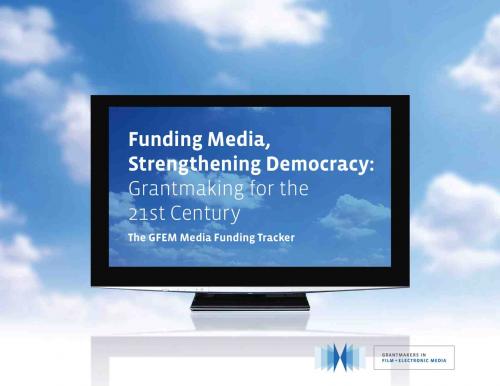
Commercial Sector Dwarfs Philanthropy in Media Support
[Source: Grantmakers in Film + Electronic Media, by Peter B. Kaufman, Mary Albon, April 20, 2010]
 Baltimore, MD – Despite the pervasiveness of media, the amount of philanthropic dollars in support of public interest media remains minuscule. The findings, released today by Grantmakers in Film + Electronic Media (GFEM), suggest that commercial interests continue to dominate media. Within a 12-month period, more commercial money was invested in a single Hollywood blockbuster than was invested in all public service media by three of the largest philanthropic donors combined: the Ford Foundation, the John D. and Catherine T. MacArthur Foundation and the John S. and James L. Knight Foundation.
Baltimore, MD – Despite the pervasiveness of media, the amount of philanthropic dollars in support of public interest media remains minuscule. The findings, released today by Grantmakers in Film + Electronic Media (GFEM), suggest that commercial interests continue to dominate media. Within a 12-month period, more commercial money was invested in a single Hollywood blockbuster than was invested in all public service media by three of the largest philanthropic donors combined: the Ford Foundation, the John D. and Catherine T. MacArthur Foundation and the John S. and James L. Knight Foundation.
The survey and ensuing report, Funding Media, Strengthening Democracy: Grantmaking for the 21st Century, calls on philanthropists to embrace a practice of transparency and information sharing via technology, to determine how existing funds are being used and how they can best be leveraged to increase philanthropic impact within the media field.
Commissioned by GFEM, Funding Media, Strengthening Democracy (downloadable below) was researched and written by Peter B. Kaufman and Mary Albon of the firm Intelligent Television. Over a one-year period, Kaufman and Albon collected grantmaking data from foundations large and small, government funders, other researchers and journalists – using an online survey, individual interviews with key foundation executives and program officers and roundtable discussions.
The report’s findings underscore that:
- Despite the current flurry of foundation support for non-profit journalism, commercial media investment outstrips philanthropy by a factor of as much as 400 to 1;
- Much of media grantmaking is invisible (even to the grantmaker!);
- Measurement of the social impact of media grants is mostly anecdotal;
- Technology-based solutions are urgently needed to enhance and leverage philanthropy;
- Public-private partnerships and other collaborative efforts are needed to enhance public interest media, and;
- Whether they fund media or not, most foundations believe philanthropic support of public interest media is vital to the greater public good.
The report makes 10 recommendations including open technology systems to enhance information sharing across the field; a system, for instance, where grantmakers enter their grantmaking information into a shared public database. Such a database would enable grantmakers to identify how dollars are being deployed and what areas are deficient and in need of support, and ultimately would enable funders and the public to trace the impact the grants are having.
“Acknowledging media as a critical component to all grantmaking is the first step,” GFEM executive director Alyce Myatt notes, “autonomy and anonymity have been the norm within the grantmaking community, but what’s needed, to make the dollars count, is transparency and collaboration. This requires nothing less than a major cultural shift in philanthropy.” She is hopeful that the report will enhance greater understanding within the field about media’s role in shaping attitudes and moving people to action. “So many of the positive social changes foundations wish to see can be expedited using tried and true media tools and by putting a face on an issue through moving-image media.”
Funding Media, Strengthening Democracy: Grantmaking for the 21st Century was made possible by grants from the Ford Foundation, the Haas Charitable Trusts and the John D. and Catherine T. MacArthur Foundation.
Download a copy of Funding Media, Strengthening Democracy: Grantmaking for the 21st Century below. A full report and separate executive summary are available.
About Grantmakers in Film + Electronic Media
Grantmakers in Film + Electronic Media (GFEM) is an association of grantmakers committed to advancing the field of media arts and public interest media funding. It serves as a resource for grantmakers who fund media content, infrastructure, and policy, as well as for those who employ media to further their program goals. GFEM members reflect a wide range of interests and approaches, but share a common interest in the key role media play in building public will and shaping civil society. GFEM is an affinity group of the Council on Foundations.
About Intelligent Television
Intelligent Television produces films, television programs, and video projects in close association with educational and cultural institutions, and its research and consulting projects explore how to make educational and cultural material more widely accessible worldwide. More information is available online at www.intelligenttelevision.com.
| Attachment | Size |
|---|---|
| FundingMediaStrengtheningDemocracyReport.pdf | 1.58 MB |
| FundingMediaStrengtheningDemocracy_summary.pdf | 364.38 KB |


